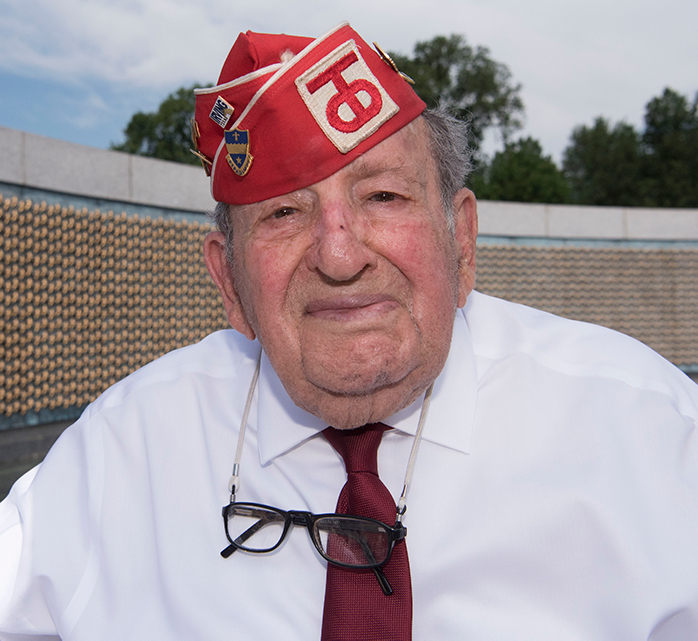Spotlight Veteran
Robert Levine
By David Vergun
On June 4, 1944, Army Pvt. Robert Levine turned 19. In a few days, the Bronx, New York, native would be visiting France. He had no money, no passport and no suitcase, but what he did have was his weapon, an 81 mm mortar.
Levine was at the Pentagon after visiting the National World War II Memorial in Washington on the 75th anniversary of the D-Day invasion. He's one of a dwindling number of World War II veterans who landed in Normandy on the northwest coast of France, along with thousands of other U.S. and Allied soldiers.
The invasion took place on D-Day, June 6, 1944. On June 10 Levine crossed the English Channel by boat from England and landed on Utah Beach along with the rest of his unit, Kilo Company, 358th Heavy Weapons Battalion, 358th Infantry Regiment, 90th Infantry Division.
The beach had been secured by the end of D-Day, so Levine's landing craft came ashore unopposed. But Levine wasn't out of harm's way. In the coming days, Levine's unit moved inland several miles. When they reached Hill 122 near Forest de Mont-Castre, Normandy, they faced stiff German resistance.
Levine said his mortar effectively helped silence some of the German guns. "In Normandy, without the mortars, they would have been in trouble," he said of U.S. forces, explaining that mortars were key in clearing the hedgerows of Normandy where Germans were dug in.
However, his luck ran out when a grenade exploded nearby, injuring him in his foxhole. Then the Germans overran his position, and the soldier with him was shot and killed trying to make a run for it, but Levine said he was wounded and surrendered.
That night, U.S. artillery barrages hit the German encampment where Levine was being held prisoner. He was critically injured and was rushed to a German field hospital, where a German doctor by the name of Edgar Woll saved his life.
Levine said he believes the doctor removed his dog tags when he was unconscious and undergoing surgery. The reason, he thinks, is because the tags had an H on them, which identified him as Hebrew or Jewish. The doctor also left a detailed note in his pocket explaining his medical condition and why one of his legs had to be amputated. Levine was sent to a German POW hospital in Rennes, France, where he remained until it was liberated in August 1944. From there, he was shipped home and spent a year at Walter Reed Army Medical Center, recovering and being rehabilitated.
After his recovery, he used his GI Bill to attend Bethany College. He subsequently went into business as an owner of a restaurant franchise in New Jersey, where he lives today.
Years later, Levine said, he was visiting Europe where he met Woll's family and they welcomed him into their home. The doctor who had saved him had died a number of years earlier. To this day, the Levine and Woll family stay in contact.
Ever since his close calls with death on Hill 122, Levine said, he often tells himself that "every day is a gift."
He credits his long life to two things: his family, including the love of his life, Edith Altman, who is still with him, and keeping a positive attitude.
Jane Powers, his daughter, said Levine's first visit to Normandy was in 1982. When he returned home, she said, the experience was transformative for him. French veterans met him and hugged him, and some of the dark memories of the war seemed to diminish. Levine has returned to Normandy a number of times since.
↓ Stars and Stripes Forever


